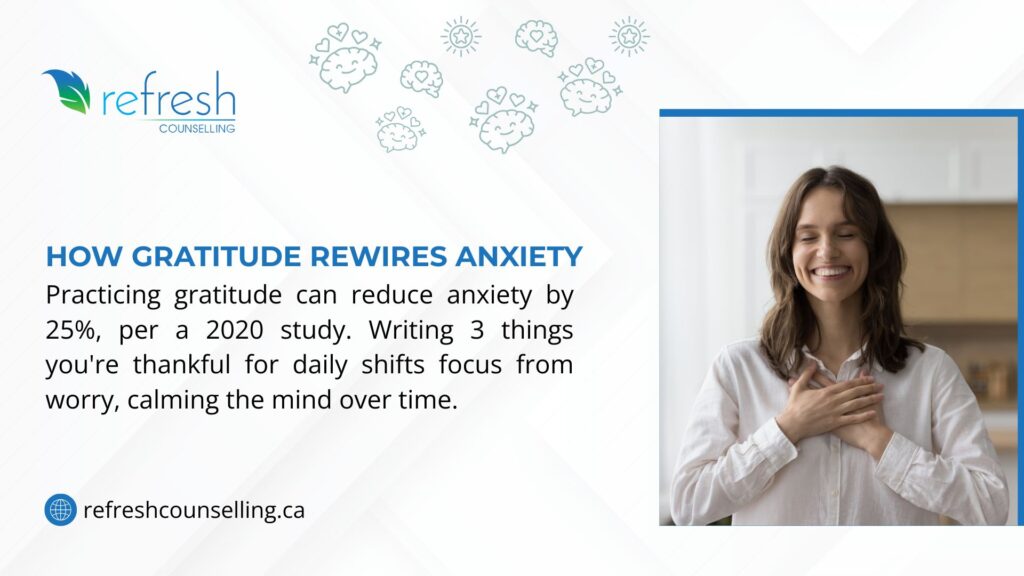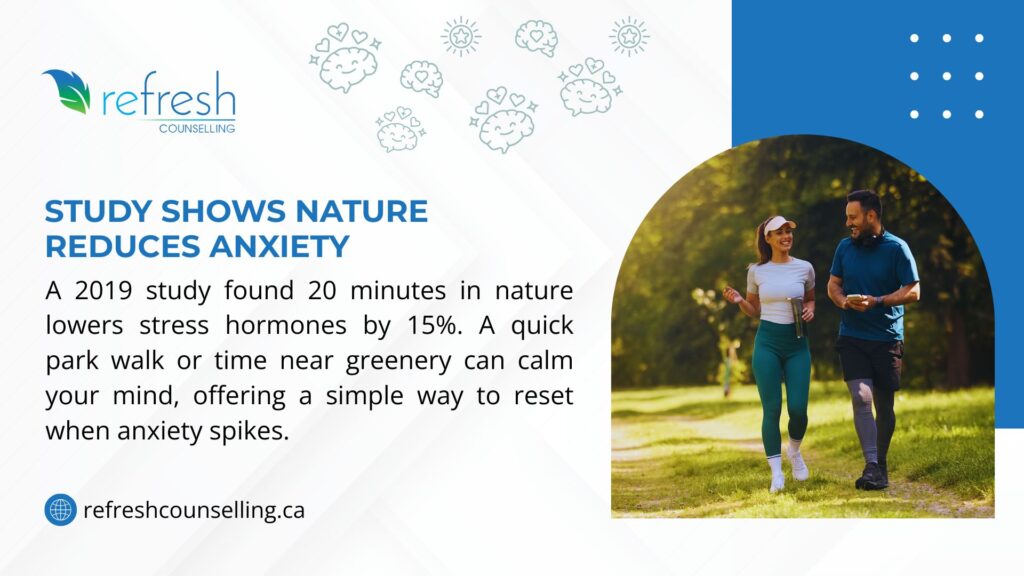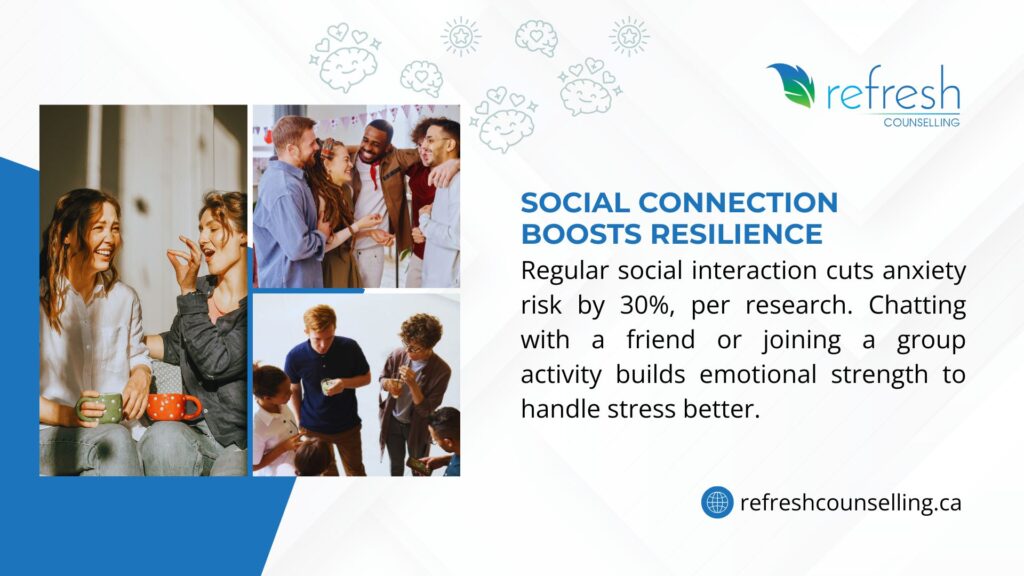One minute you’re fine, the next your heart’s pounding because you suddenly remembered you have to make a phone call tomorrow. Or maybe it’s 2 AM and you’re lying there convinced you said something stupid at dinner three weeks ago.
Learning how to calm anxiety isn’t about finding some magical cure. It’s about collecting a bunch of strategies that sometimes work, and hoping you remember to use them when your brain decides to hit the panic button over something completely ridiculous.
Your anxiety isn’t logical. That’s not your fault. Your brain’s alarm system is basically a smoke detector that goes off when you burn toast. Except instead of toast, it’s triggered by things like “Did I lock the door?” or “What if everyone thinks I’m boring?”.
What’s Really Going On When Anxiety Strikes
Ever notice how anxiety doesn’t just live in your head? Your chest gets tight, your hands might shake a little, you feel hot or cold or both somehow. That’s because when your brain thinks there’s danger, it floods your system with chemicals designed to help you fight a bear or run really fast.
The problem is, most of our daily “threats” don’t require fighting or running. Like when your boss says, “We need to talk,” or when you see that person from high school at the grocery store and you’re not sure if you should say hi or pretend you didn’t see them.
So you’re stuck with all this fight-or-flight energy and nowhere to put it. No wonder you feel awful.
Sometimes there’s no obvious trigger at all. You’re just sitting there watching TV, and suddenly your brain goes, “Hey, remember that embarrassing thing from 2019? Let’s panic about it!”
Stuff That Helps (When You Remember to Do It)
When anxiety hits hard, you need something fast. These aren’t miracle cures, but they might help dial things down from “I’m dying” to “This is unpleasant but manageable.”
Everyone talks about breathing. But it’s not about breathing perfectly or doing it “right.” It’s about giving your brain something to focus on besides whatever disaster scenario it’s cooking up.
Try breathing in for 4, holding for 7, breathing out for 8. If you lose count, who cares? Start over. The point isn’t precision; it’s distraction with a side benefit of actually calming your nervous system down.
Ground yourself in reality. When your mind is spiraling through seventeen different worst-case scenarios, you need to get back to what’s actually happening right now. Look around and name 5 things you can see. Touch 4 different textures. Listen for 3 sounds. Find 2 smells. Notice 1 taste.
Does this feel silly? Probably. Does it work? Often enough to be worth trying. Your brain can’t catastrophize about the future while it’s busy cataloging the present.
Another thing you can do is squeeze and release. Start with your toes. Tense them up tight, hold for a few seconds, then let go. Work your way up – calves, thighs, stomach, arms, shoulders, face.
Most people walk around carrying tension they don’t even realize is there. This helps you notice where you’re holding stress and actually let it go.

Long-term Things You can Do
Quick fixes are great when you’re in crisis mode, but if you want to change how to calm anxiety over time, you need to think about the everyday stuff.
Move your body somehow
Exercise is probably the most effective thing you can do for anxiety. But before you start planning some elaborate workout routine you’ll abandon in two weeks, let’s be realistic. Walking counts. Dancing in your kitchen counts. Aggressively vacuuming counts.
The point is burning off some of that anxious energy and getting your body to produce the good chemicals instead of just the stress ones. Even 20 minutes makes a difference, though you probably won’t notice it at first.
Sleep
When you’re running on four hours of sleep and too much caffeine, everything feels like a crisis. That minor work thing becomes a catastrophe. That social interaction you’re overthinking becomes proof that everyone hates you.
Good sleep doesn’t cure anxiety, but bad sleep definitely makes it worse. Same bedtime, phone in another room, bedroom as dark as you can make it. Basic stuff that’s annoyingly hard to actually do consistently.
Pay attention to what you eat
Food affects mood more than most people realize. Too much coffee makes you jittery. Skipping meals makes you shaky and irritable. Sugar crashes feel remarkably similar to anxiety attacks.
You don’t need to become a health guru, just notice patterns. Maybe you feel worse after certain foods, or better after others. Fish, nuts, leafy greens, and complex carbs generally help. Excessive caffeine, alcohol, and processed junk generally don’t.
Try meditation (but not the way you think)
Meditation isn’t about emptying your mind or achieving enlightenment. It’s about noticing when your mind wanders off into anxiety-land and gently bringing it back. That’s literally the whole practice.
Sit somewhere comfortable, focus on your breathing, notice when your thoughts drift (they will, within seconds), and redirect your attention back to breathing. You’re not failing when your mind wanders; you’re succeeding every time you notice and come back.

Dealing with the Mental Stuff
The thoughts might be the worst part of anxiety. The constant what-ifs, the replaying of conversations, the planning for disasters that will probably never happen. It’s like having a really pessimistic narrator commenting on your entire life.
Trying to stop anxious thoughts is like trying to stop hiccups by thinking really hard about it – it usually makes things worse. Instead, try treating them like background noise from an annoying neighbor. You hear it, you acknowledge it, but you don’t have to engage with every random worry your brain produces.
Sometimes the thoughts are actually useful. Maybe you really do need to have that difficult conversation or make that change you’ve been avoiding. Emotions aren’t always problems to solve; sometimes they’re messengers trying to tell you something important.
Most of the time your anxious thoughts are just your brain doing what anxious brains do – creating problems that don’t actually exist.
When You Need More Help
Sometimes handling anxiety on your own isn’t enough, and that’s completely normal. Brains are complicated. Some people need extra support, and there’s nothing wrong with that.
Consider talking to someone if anxiety is seriously messing with your life – like you’re avoiding social situations entirely, having panic attacks, using alcohol to cope, or just feeling overwhelmed most of the time.
Therapy isn’t about being broken or weak. It’s about learning skills that most people never get taught and having someone help you figure out what works specifically for you. From anxiety to empowerment, therapy can help you thrive by giving you tools tailored to your particular brand of anxiety.
Some people benefit from medication too. If your brain chemistry needs some adjustment to function properly, that’s just medical treatment, same as anything else.

Ready to Take Back Control?
If you’re exhausted from anxiety calling the shots in your life and you want to develop real, lasting skills for managing it, you don’t have to figure this out alone. Sometimes you need someone who actually understands what you’re going through to help you build strategies that work for your specific situation.Refresh Counselling focuses on practical, evidence-based approaches that help you build genuine confidence and resilience. Whether you’re dealing with constant worry, panic attacks, social anxiety, or that general feeling that something bad is always about to happen, we provide real support in an environment where you don’t have to pretend to be okay when you’re not.
